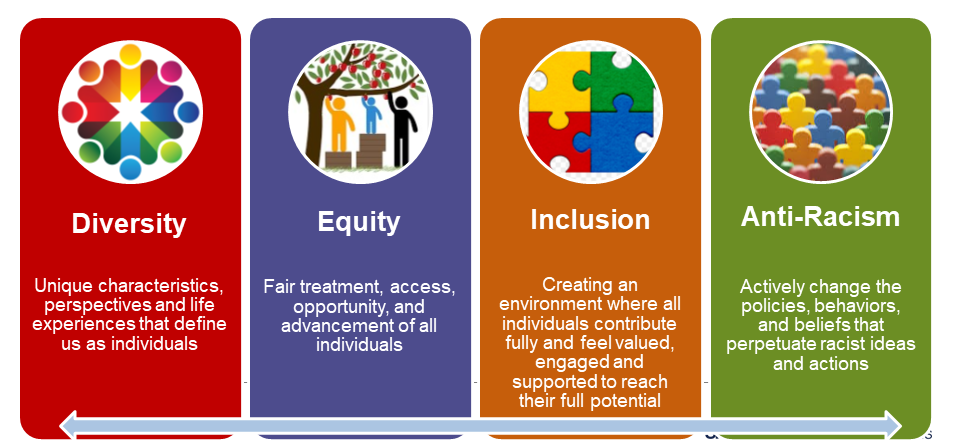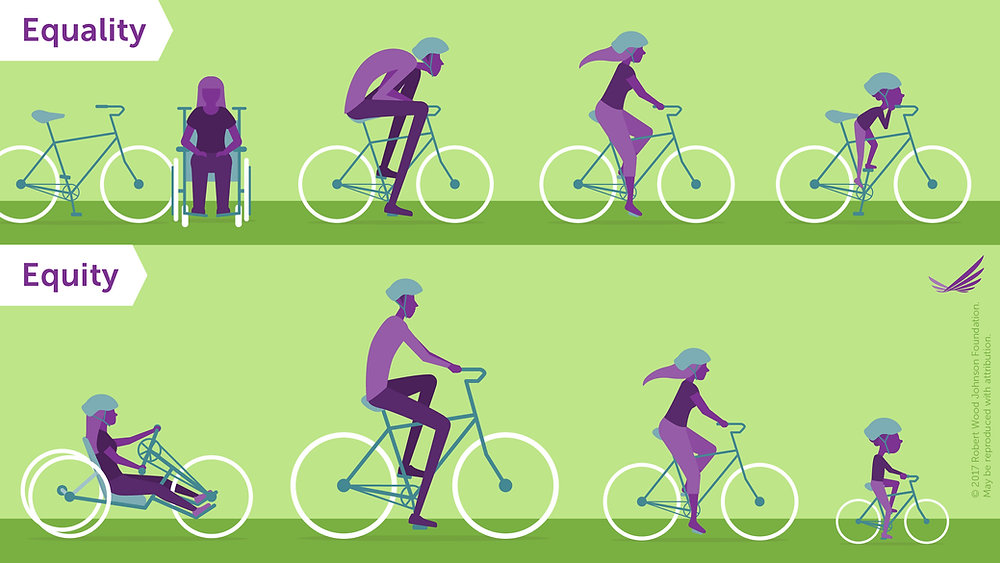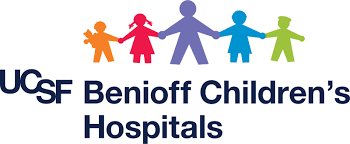What do we mean by DEI/AR?

ALLYSHIP
Guide to Allyship
An evolving open-source guide to help you become a more thoughtful and effective ally.
Bystander Intervention Trainings - Free Online by Hollaback!
Hollaback! teaches bystander intervention using our proven 5D’s methodology: Distract, Delegate, Document, Delay, and Direct. Exit polls show that 99% of people we train leave confident they will intervene next time they witness disrespect or harassment. Here are specific trainings in this space that we offer:
- Bystander intervention to address gender-based street harassment
- Bystander intervention for youth: how to stand up for others
- Bystander intervention in the workplace
- Bystander intervention to stop police sponsored vilence and anti-black racist harrassment
- Bystander intervention to stop anti-LGBTQ+ harrassment
- Bystander interventionto address anti-Asian American and xenophobic harassment
- Bystander intervention: how to be an alley when you witness online abuse
- Bystander intervention to stop stigma around learning differences
ANTI-RACISM
Harvard's Project Implicit - Implicit Association Test
Project Implicit is a non-profit organization and international collaboration between researchers who are interested in implicit social cognition - thoughts and feelings outside of conscious awareness and control. The goal of the organization is to educate the public about hidden biases and to provide a “virtual laboratory” for collecting data on the Internet. Project Implicit was founded in 1998 by three scientists – Tony Greenwald (University of Washington), Mahzarin Banaji (Harvard University), and Brian Nosek (University of Virginia). You can tak the Implicit Association Test (IAT) from a list of possible topics .
8 tools to mitigate implicit bias by Hollaback! - free online training
Everyone holds implicit biases. That doesn’t make us “bad people,” it just means that we have work to do. Through polls, brief thought experiments, and journaling, we’ll teach you how to understand and begin to undo your own implicit biases. Sign up here.
E-Learning Seminar: What You Don’t Know: The Science of Unconscious Bias and What to do About It in the Search and Recruitment Process. Association of American Medical Colleges (AAMC).
Exploring Unconscious Bias in Academic Medicine. Association of American Medical Colleges (AAMC).
Health Equity: Start Where You Are - Recoginizing Our Implicit Bias - National Institute for Children's Health Quality, Presented by Elizabeth Cote, MD, MPA; Stacy Scott, PhD, MPA; Pat Heinrich, RN, MSN, CLEProven Strategies for Addressing Unconscious Bias in the Workplace. Includes an overview of unconscious bias and includes case studies to eplore the impact of unconscious bias in the workplace. Diversity Best Practices. Sponsored by Cook Ross.
Psychologist Jennifer Eberhardt explores the roots of unconscious bias—and its tragic consequences for U.S. society - Science 27 Mar 2020:
Vol. 367, Issue 6485, pp. 1418-1421; DOI: 10.1126/science.367.6485.1418State of the Science: Implicit Bias Review 2014. Kirwan Institute for the Study of Race and Ethnicity.
The New Science of Unconscious Bias: Workforce & Patient Care Implications. This program explores the scientific basis for this new understanding of human bias and the implications of unconscious bias theory for the health care system both in terms of workforce bias and in terms of threats to clinical objectivity.
The Science of Equality, Volume 1: Addressing Implicit Bias, Racial Anxiety, and Stereotype Threat in Education and Health Care. Perception Institute.
Unconscious Bias. Cook Ross. Learn more about unconscious bias. Includes links to learn more about training and thought leadership in unconscious bias.
Unconscious Bias Training for the Health Professions. Association of American Medical Colleges (AAMC).
Women in Science. This special issue of Nature takes a hard look at the gender gap — from bench to boardroom — and at what is being done to close it.
The Neuroscience of Unconscious Bias. The American Bar Association Litigation Section.
Unconscious Bias in Academic Medicine. Proceedings of the 2017 AAMC Diversity and Inclusion Innovation Forum.
VIDEOS
DIVERSITY
UCSF Diversity Inclusion
April 28, 2017
UCSF Joins “It Gets Better” Project
October 11, 2012
Don’t Put People in Boxes
May 22, 2017
EQUITY

What is Equity
Equity is the fair treatment, access, opportunity, and advancement for all, while at the same time striving to identify and eliminate barriers that have prevented the full participation of some groups. Equality is about ensuring that everyone has the exact same resources, while equity requires distributing resources based on the different needs of the recipients.
Racial Equity Tools
Racial Equity Tools is designed to support individuals and groups working to acheive racial equity. This site offers tools, research, tips, curricula and ideas for people who want to increase their own understanding and to help those working toward justice at every level - in systems, organizations, communities and culture at large.
Miles to Go before We Sleep: Racial Inequities in Health
by David R. Williams. Journal of Health and Social Behavior 53(3) 279-295
Syllabus: 21- Day Racial Equity Habit-Building Challenge
The Challenge invites participants to complete a syllabus of 21 short assignments (typically taking 15-30 minutes), over 21 consecutive days, that include readings, videos or podcasts. It has been intentionally crafted to focus on the Black American experience. The assignments seek to expose participants to perspectives on elements of Black history, identity and culture, and to the Black community’s experience of racism in America. Even this focus on Black Americans cannot possibly highlight all of the diversity of experiences and opinions within the Black community itself, much less substitute for learnings about any other community of color. This syllabus is but an introduction to what we hope will be a rewarding journey that extends far beyond the limits of this project.
Center for the Study of Racism, Social Justice & Health
This is a multidisciplinary, collaborative research center housed in the Department of Community Health Sciences in the Fielding School of Public Health at the University of California at Los Angeles (UCLA). This new center launched in October 2017 on what previously had been celebrated as Columbus Day.
The Center is distinguished from other disparities-related research units at UCLA by its primary focus on the health implications of racism for diverse populations. Public Health is both an academic discipline and an applied one. Therefore, the Center encourages the translation of research findings for use by public health professionals, community organizations and policymakers in their ongoing health equity efforts. You will find resources for each audience throughout this site.
IMPLICIT BIAS
INCLUSION
Power Point Presentation: Creating Inclusive Learning Environments
Presented by Stanley M. Lo, UC San Diego, at the Harvard Medical School on May 12, 2017
MICROAGGRESSIONS
ARTICLES
Racial Microaggressions in Everyday Life – Is Subtle Bias Harmless?
Written by Derald Wing Sue, PhD, in Psychology Today, October 5, 2010
Microaggressions don’t just “hurt your feelings”
Written by Alia E. Dastagir, USA Today, February 28, 2018
Allies and Microaggressions – When you see microaggressions occurring against colleagues, how should you respond?
Written by Kelly Ann Rockquemore, Inside Higher Ed, April 13, 2016
Microaggressions are a Big Deal: How to Talk Them Out and When to Walk Away
by Andrew Limbong. NPR. June 9, 2020
FACT SHEETS
What is Microaggression? – University of Arizona
This information resource was created to aid students, faculty, staff and individuals of the broader community to better understand microaggressions and to take steps towards active allyship. This brochure was adapted from resources at the University of South Dakota
Tool: Recognizing Microaggressions and the Messages They Send
Microaggressions are the everyday verbal, nonverbal, and environmental slights, snubs, or insults, whether intentional or unintentional, that communicate hostile, derogatory, or negative messages to target persons based solely upon their marginalized group membership (from Diversity in the Classroom, UCLA Diversity & Faculty Development, 2014). The first step in addressing microaggressions is to recognize when a microaggression has occurred and what message it may be sending. The context of the relationship and situation is critical. Here are common themes to which microaggressions attach.
Tool: Interrupting Microaggressions
This tool provides examples of Alleyship interventions and various communication approaches to use when microaggression occurs.
Avoiding Microaggressions in Classrooms and Online - College Educated
PRESENTATIONS
Power Point Presentation: Unpacking Microaggressions
Presentation by Lindsey Brooks, PhD, and Alexandra Thurston, PsyD, UCSF Student Health & Counseling Services
VIDEOS
Microaggressions: Comments That Stings
by Channo Hodge and Tanzia Vega at the NY Times, March 21, 2014
MINDFULNESS
What is Mindfulness? When and how often should I practice mindfulness exercises? by the Mayo Clinic staff
6 Mindfulness Exercises you can try today by Alfred James on pocketmindfulness.com
Address Diversity and Inclusion Through Mindfulness by Joshua Ehrlich at the Association for Talent Development
RESILIENCE
Resilience in the Workplace - free online training by Hollaback!
We’ll all inevitably face defeat in the workplace. The question is: how to respond? A resilient workforce is more able to take risks and bounce back from failure. This training will help your team build the resilience it needs to keep going strong. Learn more.
Resilience in the face of COVID-19 - free online training by Hollaback!
If you’re scraping the bottom of your resilience bucket during COVID-19, this training is for you. With science as our guide, we’ll learn concrete tools to help you better manage and make sense of pain and trauma in this moment. Take the free training and learn more.
TRAUMA INFORMED CARE
Going beyond asking what happened: buidling beloved community by Kanwarpal Dhaliwal, ACEs Connection 2/7
One of the most notable descriptors of trauma-informed care is shifting the question of what is wrong with you to what happened to you. While certainly less harmful than asking what is wrong, for RYSE Youth Center, asking what happened still falls short of affirming and recognizing young people of color’s fortitude and agency. Asking what happened continues to render the problem in/on the individual, overemphasizing behavioral change while foregoing the ever-needed scrutiny and emphasis on systems change.
